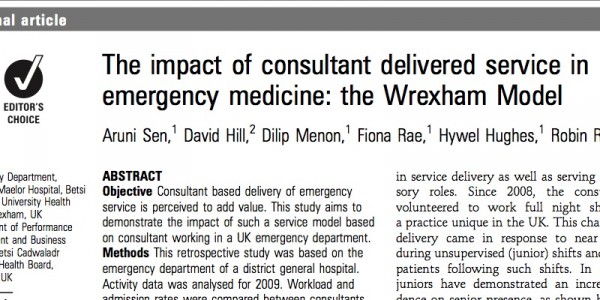 Sen A, Hill D, Menon D, Rae F, Hughes H, Roop R. The impact of consultant delivered service in emergency medicine: the Wrexham Model. Emergency Medicine Journal. 2012 Apr. 20;29(5):366–71. PMID 21490371
Sen A, Hill D, Menon D, Rae F, Hughes H, Roop R. The impact of consultant delivered service in emergency medicine: the Wrexham Model. Emergency Medicine Journal. 2012 Apr. 20;29(5):366–71. PMID 21490371
Emergency departments in the UK and Ireland are frequently staffed differently than they are in our major comparable nations (US, Canada, Australia and New Zealand).
There are advantages and disadvantages. Often there’s a “the grass is always greener” thing going on and everything that happens in a different system to yours is better. This is not a post about how terrible EM is practised in the UK and Ireland.
One of the major concerns with EM in the UK and Ireland is the lack of EM consultants. The College of Emergency Medicine has appropriately highlighted this and made it a major target to increase consultant numbers. Having senior, trained people looking after you in the ED is (hardly surprising) important and is being (of course, slowly and with great difficulty) addressed.
The ED in Wrexham hospital is unusual in the UK as the consultant emergency physicians work regular night shifts. So if you come in with a sprained ankle or an aortic disseciton at 3am the chances are you will get seen by an ED consultant. At the very least there will be an ED consultant on the floor at 3am. [UPDATE: Comment from Matt – “To correct a minor point: in Wrexham, consultants work Monday to Thursday nights (block of 4 nights, about 3 or 4 times a year). Friday through to Sunday it’s SHO tier (i.e. often second postgraduate year) only at nights.”)
They have 5 consultants for 60000/yr and as a result only some of the nights are covered by a consultant on floor over night. The rest are covered by a middle grade doctor (think senior resident) with a consultant EP on call.
In the study they looked back at their numbers and waiting times and compared the night shifts when the consultant was on the floor with a night shift when a middle grade was on.
The comparisons are interesting (and no unproblematic) and show overall that there was a benefit to having to having a consultant on the floor at night.
I’m much more interested in the discussion that might stem from this:
- For consultants currently in post – how would you feel about moving to work night shifts?
- For trainees coming through – how do you feel about working night shifts till your 50s (or later)?
My thoughts
- I find it frankly odd that the vast majority of the sickest, often most difficult and certainly high risk patients are looked after by (usually excellent and more than competent) junior doctors. We get away with it it seems but that doesn’t make it a good idea. I think it’s a great idea that we should do night shifts. Of course I may be totally wrong on that.
- Having consultants on the floor is a wonderful opportunity to get trained. I’ve learned a lot of my most important lessons with a critically ill patient at 6am when the department is quiet enough to spend the time that needs to be spent with the sickest patients as opposed to “turf to medics” and get back to queue-busting.
- It may be a complete waste to have consultants work night shifts. This all depends on your ED. Some EDs go quiet and attendance rate drops way off overnight. Is 60000 an appropriate cut off – maybe it should be 100,000. I’m a fan of big hospitals and big EDs, the trend to centralisation and closure of small hospitals is a good one even if not implemented all that well. Having a consultant on the floor overnight may not be worth it in a lot of the hospitals in the UK and Ireland.
- there is significant variation in practice patterns between doctors (both junior and senior). Some see a lot of patients, some see a lot fewer. As usual there are good and bad aspects to this. You need to know your staff. If you have motivated consultant staff willing to engage in clinical practice like this then great, if it’s mandated from on high and not planned with respect to your work force it may just be a rather costly and inefficient way to do things.

Hey Andy,
My answer would be yes and no.
There is a certain size ED that likely warrants a ED consultant on overnight but its not needed for smaller departments. how do you decide that…for wiser minds.
I agree excellent teaching at 4-5-6am as there is often not alot about and you get face time with the bosses. even if its just discussing cases “In My day….”
This needs to be balanced with the “burnout” effect. We all know ED is a hard slog sometimes for the consultants and doing nights really adds to this. Its very disruptive to your life, being on call is less so.
Hope that makes some sense.
i would quite like to work nights as a consultant. I’m 8 years out and i still enjoy them. The big thing i want is not to work too many of them. Ideally I want a 3 day clinical week and the rest of the time to bum around in the garden. I don’t want or need the money. Let me do nights, pay me less and let me hang out with my family. This is my slightly rose tinted view of my career coming out here…
Why should ones care vary so much depending on what time you feel ill, when the ambulance brings you in or when you’re seen. As patients we demand to have best care possible whenever – not necessarily by the consultant but by appropriately supported juniors.
Funnily enoughy, one of my relatives was seen in Wrexham ED at 4am last week and was seen by the lead author.
To correct a minor point: in Wrexham, consultants work Monday to Thursday nights (block of 4 nights, about 3 or 4 times a year). Friday through to Sunday it’s SHO tier (i.e. often second postgraduate year) only at nights. So I’m not sure you can draw a direct comparion between consultant and SHO on an observational study. The day of the week is likely to be an influence as well.
As to what age to do nights at, it’s a tricky one. I’m a consultant in my late 40s (like John Ryan, feels younger, not sure where the years went). I think dropping nights at 50 might be a bit tricky. You’d spend half of your consultant career not doing nights. Unless you have a big excess of consultants it makes for a fairly heavy rota for the younger ones. There is also very little evidence that age is a major factor in coping with night shifts. Some people have trouble coping and this proportion rises a bit with age (low quality and equivocal evidence for that). But that’s not to say a particular 65 year old will necessarily cope worse than the average 30 year old.
I think we also need to look at places where senior doctors regularly do night shifts in Emergency Medicine- US and Canada. How do they do it, how long is their career as an attending, what is the burn out rate etc.
Should add: my own stance (as what is these days possibly an older consultant) is that older consultants should be doing nights. If you can work a workable system for doing nights there is no sound reason why older consultants can’t do it (appreciating John Ryan’s point about missing meetings being a problem- and if you make one consultant the clinical director and the other 20 doing nights, you’ve effectively got 20 doctors missing meetings and one guy who risks being out of touch). If you can’t work out a workable system there’s no sound reason why younger consultants should be doing it. Either include older consultants or don’t do it. But we need to make sure it’s a workable one that doesn’t burn too many people out over what is potentially a 40 year consultant career.
cheers for the comments Matt, i’ve added the correction to the post. Andy
Hi Andy [others]
I was initially alarmed when one of you asked me at ICEM whether I do night shifts!
I think that the patient deserves to see the expert [me] and not the junior trainee [no matter how experienced they are]
Reflecting back – If I was working with myself in my 5th year of residency I would trust 90% of what I was hearing, but there’s that 10% that would have needed “consultant-Nadim”. In EM that 10% could mean the difference between dx/no dx; patient complaint/no complaint or [gulp] life/death.
Unlike our ER’s where learners are there for mostly education and less “service” – our wards are entirely staffed by junior/senior trainees at night and all our ER radiology is read by trainees …who are providing valuable “service” [and need to do so in order to learn how to be a consultant]
so it’s a complex issue & I don’t know if there’s a right answer for all…
that’s my 0.02c…keep the excellent blogs coming my friend[s]
having similar numbers of certified EPs running our EDs is simply not on the table in the UK/Ireland – it would further bankrupt an already bankrupt health service. In an ideal world, or at least in an alternately funded one, we could approach the north american model, but it would also mean radically changing our training models as well. I’m 8 years out and another 5 to go to be “trained” as an EP – partly my own meandering career path, but partly because it just takes a long time to achieve the experience and seniority we expect of EPs here.
Sorry for the late reply but coming from a junior doctor’s perspective, the best would be if the training numbers were increased to double of what it is now (around 1100 in England), by 2020. That way
– junior doctors who are all keen on EM can actually have a career in EM,
– there will be more consultants in the ED (good for the patients and for the next gen of junior doctors),
– which will make possible those workable shift rotas that you are speaking of, Andy.
So basically everybody wins. Including the system in the long run from the reduced medical errors, reduced number of unnecessary tests ordered, happier junior doctors, fewer returns to ED and so on.
And in any case, in a system where you don’t have a choice of provider, it should be unacceptable that you get to be seen by anybody else other than a consultant. What’s the point of NHS if out of all that money that goes into it there isn’t enough to have 2000 rather than 1000 EM consultants?
And it’s not even the money, the money is there, it’s just this weird ingrained belief in people that make the rules (DoH, managers) that we don’t need more consultants in the NHS. It always leaves me wondering if it is because they actually rarely use NHS services…
Hi alina
Sorry for my own late reply. Agreed that consultant expansion is the way forward. “Sickest looked after by the thickest” model of care can’t be a the best option.
The consultant jobs of the future will be increasingly hands on and shop floor, which some of the older consultants mightn’t like but which really encourages me.
Pingback: The LITFL Review 078